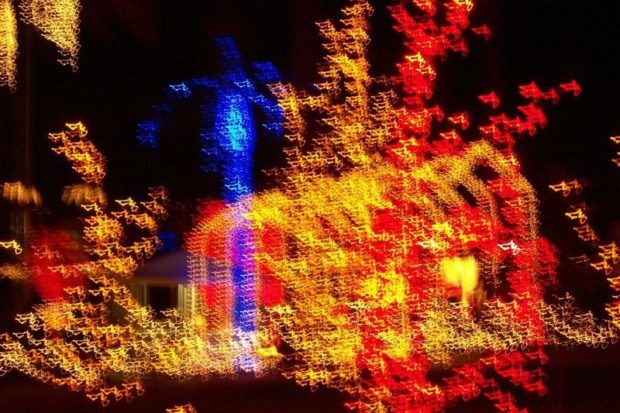

By Leonard Adame
People will mail cards wishing one another a warm and bountiful Christmas. They will say “Merry Christmas” in dozens of ways on their minutely decorated cards. They will wrap their children in thick-hooded jackets and scarves. They will stuff them in SUVs and cars and brave fog and rain and dark roads to visit their friends and relatives. Everywhere they land, they’ll be greeted with hot chocolate and warm hugs and Christmas carols echoing throughout the houses.
Perhaps they will watch A Christmas Story or White Christmas for the 20th time. Or maybe they will watch football or something else that’s entertaining. The houses will look like decorated cakes as Christmas lights running along the eaves glow in the dimness and presents wait under transformed trees like eggs to hatch in front of kids. Eggnog, toddies, shots of 100 proof, punch and other liquids will be drunk. Later, when the kids sleep like puppies against each other, adults will reminisce about those who are no longer present, about Christmases when they were kids. Some may argue, some may cry, some may look quietly into the distance and some will ask for coffee in hopes of sobering for the drive home.
 All of that Christmas interaction is part of my past. I would only add that we consumed dozens and dozens of tamales straight from the steamer. People joined to make tortillas and salsa and sing some songs in Spanish. Some of us stopped before altars in a corner or in a bedroom to remember or to speak to ancestors.
All of that Christmas interaction is part of my past. I would only add that we consumed dozens and dozens of tamales straight from the steamer. People joined to make tortillas and salsa and sing some songs in Spanish. Some of us stopped before altars in a corner or in a bedroom to remember or to speak to ancestors.
From my earliest memories of Christmas, these things were normal occurrences. I always knew that Christmas would come, that I’d be among dozens of adults, people who always fascinated to me, especially when I saw them kissing in the kitchen or in their cars. My little cousins also were fixtures, little tornados that almost always broke bulbs and crushed presents as we ran for hours in and out of the house and through dimly lit, even ghostly hallways.
Now I’ve learned, many decades later, that these things in fact have not been normal. I was truly shocked to learn, at this later point in my life, that many people had never celebrated Christmas, had never received presents, that many kids had lived in homes (and some still live in places like that) with strangers who often mistreated them.
I was shocked to learn so many people spent Christmas on treacherous and icy streets, in allies and doorways next to dumpsters or on grates regurgitating hot air from big buildings. I was shocked to learn so many of these people have never had jackets, blankets, Christmas dinners, much less tamales and salsa. Yes a few went to the local charities to eat, but only after involuntarily listening to an hour of sermonizing about their sinful ways.
I was shocked to learn so many had no relatives or if they did have families, they were far away and unaware that one of their number was literally out in the cold, barely surviving the often freezing and indifferent nights. I was shocked that in the city where I grew up, Fresno, so many people who insist they’re Christians could let this happen, could not concern themselves with helping people to live decent and safe lives, to get healthcare and enough to eat. Yes, there are many volunteers who in fact work hard to help the homeless and disenfranchised. But unfortunately, they’re in the minority.
It would in fact take the members of the entire community to work together to help people who can’t help themselves, no matter how many sermons to the contrary.
To those who do help all they can, I say you’re saints in the making. But to others who would rather judge the homeless, who would rather say they could get jobs and apartments if they really wanted to, that they are taking advantage of the generosity of others, that they’re generally lazy, and on and on, I say don’t call yourselves Christians. Don’t go to church every Sunday (or more often). Don’t sing hymns, don’t praise Christ, don’t think of heaven as a paradise awaiting you for your good deeds, and certainly don’t think God would agree with your inactions and indifferences.
Instead, be honest and say you don’t really care. God, I believe, would appreciate that.
The fact is that people, Christian or otherwise, deserve to be looked after, or rather, we all need to look out for one another. The things I’m saying aren’t recent revelations or new epiphanies. These things throughout centuries have been proclaimed so many times that people should have them memorized. Yet too many of us simply stay in our own bubbles, ones we’ve filled with contentment and celebrations that concern only our relatives and friends.
If this world is to survive, each community must see to it that inequities are destroyed and that people can be honored just because they’re people. This means caring and providing for all, not just those we think good and proper.
Perhaps then what I thought was normal when I was young could actually become so, perhaps then people won’t spend Christmas wandering the darkness at midnight, shivering like abandoned children in an old car. Perhaps churches will then be relevant, their sermons more about how to help and appreciate all people rather than about advising people to think of their individual salvation, their own spiritual interests.
If this were to come to pass, then Christmas would be more a celebration of the events and actions that have been undertaken all year long and which have saved lives and made sure there was enough food for all, enough safe places to sleep, and enough caring to eliminate xenophobia and all of the other negative philosophies that keep us apart.
Merry Christmas.
*****
Leonard Adame has retired from teaching college English. He now plays drums in various bands, takes photographs, reads mystery novels to a fault and has published poetry in college anthologies. He most enjoys re-learning about human beings from his grandkids. Contact him at giganteescritor@hotmail.com.
